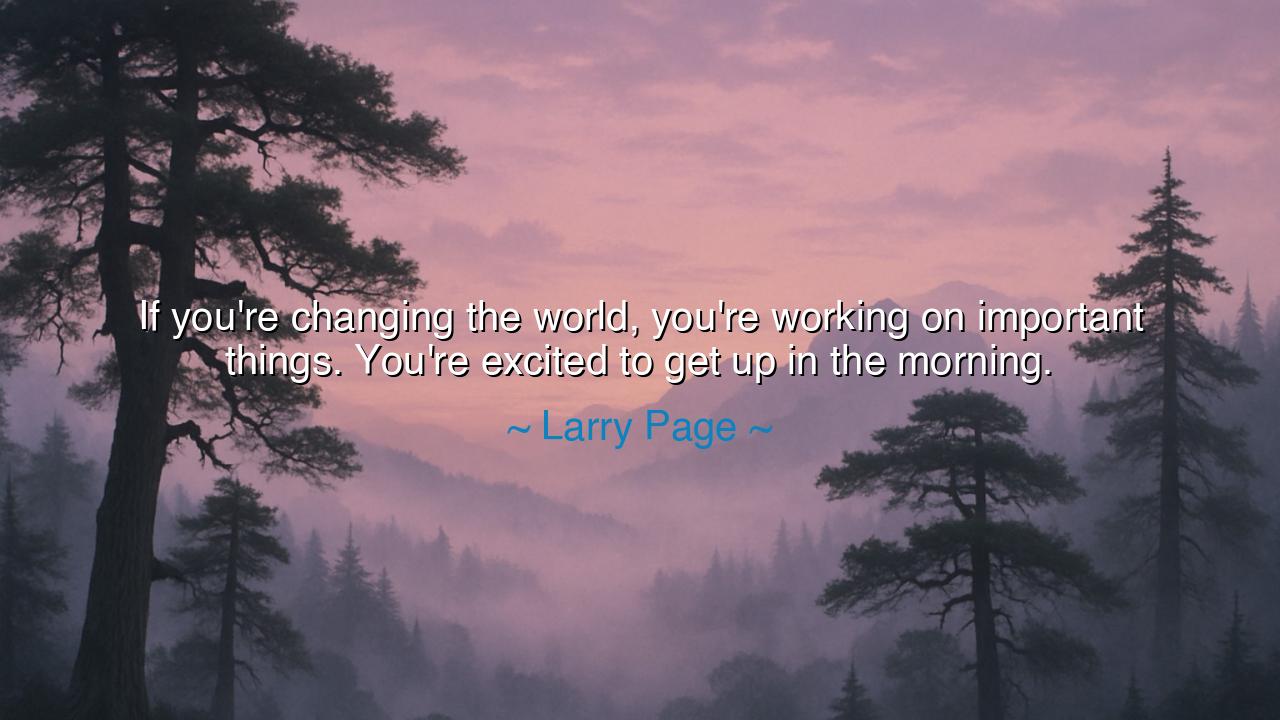
If you're changing the world, you're working on important
If you're changing the world, you're working on important things. You're excited to get up in the morning.






The visionary of the digital age, Larry Page, once spoke a truth that resonates far beyond the world of technology: “If you're changing the world, you're working on important things. You're excited to get up in the morning.” At its heart, this is not merely a statement about invention or business—it is a call to the human spirit to bind itself to work that matters, to labor not for small gain but for transformation. To change the world is to live with purpose so great that even the dawn becomes a summons of joy, not a burden of duty.
This quote reveals the eternal link between purpose and passion. When one is consumed by a mission that shapes the destiny of others, fatigue becomes lighter, obstacles less daunting, and the very act of rising in the morning becomes an act of triumph. The ordinary man dreads the day because his labor feels hollow; the world-changer greets the sun with eagerness, for each day is another chance to move mountains. Page, as the founder of Google, understood this deeply: the quest to organize the world’s knowledge was not just a business, it was a mission that lit fire in the soul.
History is rich with those who embodied this truth. Consider Florence Nightingale, who transformed the care of the sick during the Crimean War. Her work was grueling, her days consumed with suffering and exhaustion. Yet she rose each morning with energy, because she knew that her hands were altering the fate of thousands. The flame of her purpose outshone the weight of her toil. Like Page’s words, her life proves that when you labor for the world, the world itself lends you strength.
Even among leaders of nations, this principle endures. Abraham Lincoln, in the darkest days of America’s Civil War, bore the crushing weight of a divided nation. Lesser men would have collapsed, but Lincoln rose each morning with the knowledge that his mission was larger than himself. To preserve the Union and end slavery was an important thing, and because of that, he found the courage to endure sorrow, ridicule, and unimaginable strain. His mornings were not easy, but they were purposeful, and that purpose carried him forward.
The meaning of this quote, then, is that the secret to joy is not leisure or ease, but engagement in work that transcends the self. When our actions ripple outward to shape the lives of others, when they carry the weight of significance, we discover energy that no rest could give us. To change the world, whether through invention, service, or justice, is to touch the divine rhythm of existence—to live not as a passerby, but as a maker of destiny.
The lesson for us is clear: seek not merely comfort or survival, but important things. Ask yourself: does my work lift others? Does it heal, inspire, create, or transform? If the answer is yes, then the weariness of effort will be replaced by the thrill of purpose. If the answer is no, then perhaps you have not yet found your true calling. For the world is vast, and each of us has a role to play in shaping it—whether great or small, every contribution matters.
Thus, Larry Page’s quote is more than advice for entrepreneurs; it is an anthem for humanity. It reminds us that to live fully is to live with mission, that the most joyful mornings are born not of luxury but of responsibility. Let us then rise each day not with dread but with eagerness, knowing that the work of our hands, if done with purpose, can alter the course of the world. And may we find in that knowledge the strength to meet each dawn with excitement, as co-creators of the future yet to come.






AAdministratorAdministrator
Welcome, honored guests. Please leave a comment, we will respond soon